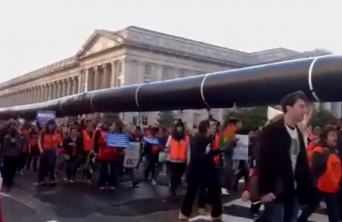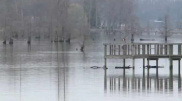Keystone XL Permit Process Sparks Investigation, Protest
Questionable permit review practices that TransCanada engaged in to prepare for the Keystone XL Pipeline have sparked an internal review by the state department and a 10,000 person protest.
According to the Los Angeles Times, Deputy Inspector General Harold Giesel said the investigation will determine “to what extent the [State] department and all other parties involved complied with federal laws and regulations relating to the Keystone XL pipeline permit process.”
Among specific issues, the review will examine the accuracy of studies associated with the project and an alleged conflict of interest between TransCanada and consulting firm Cardno Entix.
Giesel said the alleged conflict of interest was brought to his attention on Oct. 26, when 15 members of Congress sent a letter stating the lawmakers were "disturbed" by how the State Department allowed TransCanada to pick the consulting firm that would review its practices.
"On its face alone, this creates an appearance of a conflict of interest and raises several questions," said the letter, quoted at the New York Times.
As a part of the State Department's assessment of the pipeline, it allegedly asked TransCanada to recommend a firm to conduct the environmental review.
The pipeline company was reviewed by Cardno Entrix, a consulting firm that has a long history with the pipeline company and names TransCanada as a major client within its own promotional materials.
Cardno Entrix provided the State Department with assessments to consider before approving the proposal, including a study stating the pipeline would have "minimal" environmental impact.
These actions served as a major theme at a protest against the pipeline held at the White House on Sunday, where an estimated 10,000 took to the streets to voice their concerns.
Erich Pica, president of Friends of the Earth, told the Edmonton Journal that, beyond environmental concerns, the corruption behind the deal should be enough to stall the pipeline's construction.
"There is overwhelming evidence that the pipeline review process has been a sham, corrupted by bias, lobbyist influence and conflicts of interest," said Pica.
WATCH:






